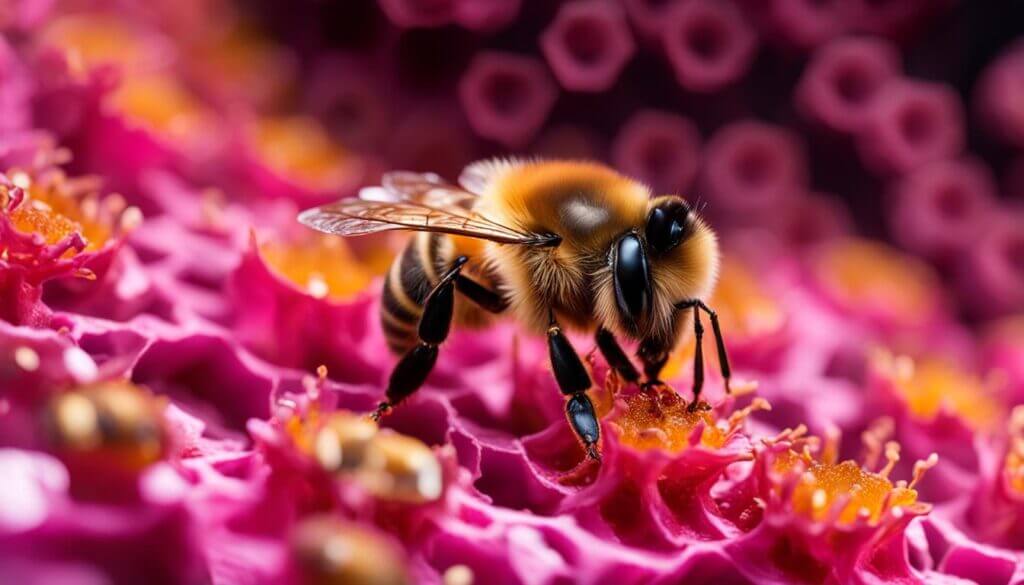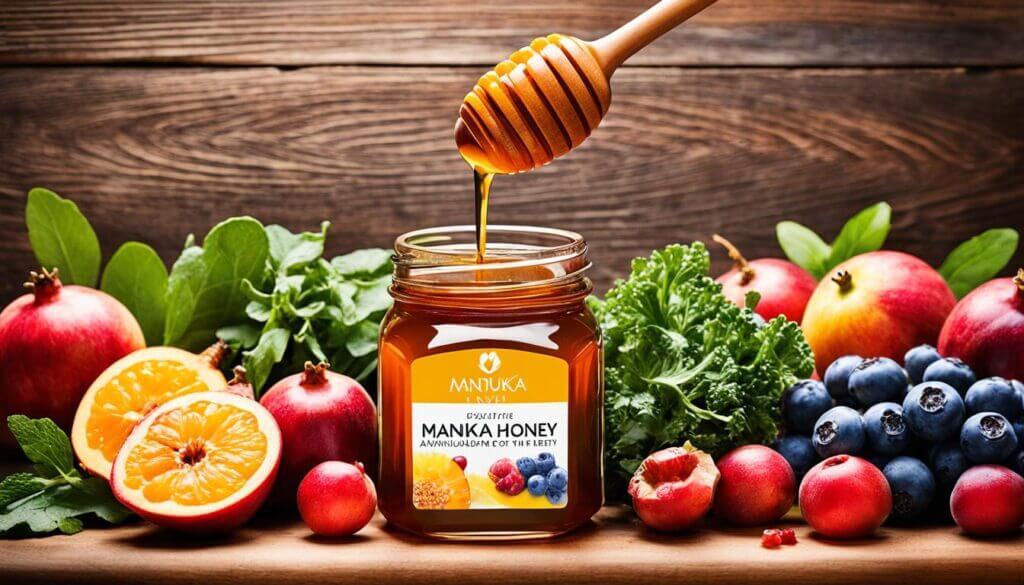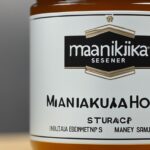Amidst the myriad natural cancer remedies, one has risen to notoriety not just for its sweetness but for its surprisingly potent medical properties. Notably, research suggests the healing properties of honey, particularly Manuka honey, may include antitumor benefits and could play a supportive role in cancer treatment. This lesser-known side of honey is sparking significant interest in the realms of both modern and alternative cancer treatments.
In the complex fight against cancer, Manuka honey stands out as a potential ally. Its unique composition has initiated a surge of interest within the scientific community, with studies revealing a possible impact on tumor growth and an enhancement in patient survival rates. As a forerunner in Manuka honey cancer support, the sweet nectar is curating a buzzworthy presence in the ever-expanding domain of natural cancer remedies.
The Unique Properties of Manuka Honey
Harvested from the exotic Leptospermum scoparium, or Manuka bush, native to the untamed wilds of Australia and New Zealand, Manuka honey transcends its role as a mere culinary delight. Its Manuka Honey Unique Benefits lie in the indulgent texture and complex taste that are mere precursors to its remarkable healing traits. Researchers have been captivated by its Honey Healing Properties and its abilities to treat an array of health issues with potent efficacy.
Renowned for its Manuka Antimicrobial Effects, this elixir of wellness is a warrior in the battle against antibiotic-resistant strains of bacteria. Its scope of effectiveness stretches to the domain of oncology where it illuminates new possibilities within adjunctive cancer care. The healing honey’s constituents such as methylglyoxal, compound with proven cytotoxic effects against certain cancer cells, solidify its position as therapeutically precious.
| Component | Healing Property | Beneficial Application |
|---|---|---|
| Methylglyoxal (MGO) | Antimicrobial Activity | Combatting Pathogens |
| Dihydroxyacetone (DHA) | Antioxidant Capacity | Enhancing Immune Function |
| Hydrogen Peroxide | Antiseptic Quality | Wound Healing |
| Bee Defensin-1 | Immune Modulation | Supporting Adjunct Cancer Therapy |
As studies like those conducted by Gheldof et al. (2002) and Al-Mamary et al. (2002) have illuminated, Manuka honey stands out for its rich content in antioxidant components, which may contribute to minimizing the oxidative stress associated with cancer development. This interplay of components renders the honey not only a balm for the body but a potential agent for medical innovation, particularly within cancer care.
While Manuka honey’s delightfully complex flavor profile secures its status as a gourmet staple, it’s the promise within the domain of health and healing that positions it as a vanguard in fields as diverse as dermatology, gastroenterology, and oncology. Its dual identity as a luxurious spread and a medicinal marvel exemplifies the harmonious intersection of indulgence and wellness—indeed, a gift from nature bestowed upon those who seek both pleasure and vitality.
Exploring Manuka Honey’s Antitumor Effects
The emerging body of Manuka Honey Cancer Research presents compelling evidence for its use as a complementary therapeutic agent. Its reputation as an effective promoter of Cancer Cell Apoptosis is supported by several preclinical studies, illustrating Manuka honey’s capability to disrupt the proliferation of malignant cells. This natural resource is steadily gaining recognition for its Honey Antineoplastic Activity, an attribute that captures the attention of the scientific community dedicated to oncology.
One of the most significant findings in recent years involves Manuka honey’s apparent efficacy in activating apoptotic mechanisms within cancerous cells. Investigations by Swellam et al. on bladder cancer, Tomasin & Gomes-Marcondes on a general tumor growth model, and Jaganathan & Mandal’s work with colon cancer cells, all point to a common potential—Honey Antitumor Properties that can not only hinder cancer cell growth but may also initiate the process of programmed cell death.
The ability of Manuka honey to induce apoptosis aligns with the growing trend in cancer therapy to seek out agents that can selectively target tumor cells for destruction. The necessity for treatments that can function alongside, or potentially replace, chemotherapy with lesser side effects is a key focus in oncology, and Manuka honey’s properties suggest a harmonious synergy with existing cancer therapies.

Attempting to understand the full scope of Manuka honey’s impact on cancer, researchers have begun to explore various concentrations and delivery methods. The results paint a promising picture for the future of Manuka honey as an adjunct in cancer treatment protocols. With ongoing trials and in-depth analysis, the hope persists that Manuka honey will maintain its status as the subject of intense study and discussion within cancer research circles.
As research progresses, the scientific community remains vigilant, eagerly awaiting detailed results from upcoming trials that will further elucidate the role of Manuka honey in cancer therapy. In the meantime, the anecdotal and preliminary scientific support for Manuka honey’s antineoplastic activity continues to offer a glimmer of hope for its integration into mainstream cancer treatment strategies.
Molecular Mechanisms behind Manuka Honey’s Benefits
Unraveling the complexity of Manuka honey’s impact on cancer, scientists are continuously discovering how this natural substance interacts with molecular targets within the body. Through its multifaceted interaction with various cellular pathways, Manuka honey has shown promises as a dietary agent in cancer prevention and therapy. The following insights delve into the intricate ways in which Manuka honey exerts its influence at the cellular level.
Significant research efforts, including those by Aggarwal et al. (2003) and Wang & Lenardo (2000), have revealed how certain dietary agents, like honey, are capable of mediating crucial biochemical pathways linked to cancer cell survival. One such pathway involves NF-κB, a protein complex that controls DNA transcription and is known for its role in cellular responses to stimuli. Manuka honey’s ability to inhibit NF-κB activation positions it as a potential honey cancer therapy agent. Moreover, the suppression of IκBα kinase activity and p65 phosphorylation by honey highlights its potential as a modulator of apoptosis regulation by honey.
Apoptotic regulation is another domain where honey demonstrates its influence, specifically through the modulation of mitochondrial functions. The apoptosis-inducing factors within honey have drawn attention due to their ability to initiate programmed cell death in cancerous cells, a desirable target for therapy. The landmark studies by Susin et al. (1998) and Jaganathan & Mandal (2010) underscore the potential of honey in precisely targeting the mitochondria of cancer cells to trigger apoptosis, thereby reinforcing its role as a natural therapeutic agent in the fight against cancer.
| Molecular Target | Impact on Cancer Cells | Study Reference |
|---|---|---|
| NF-κB Activation | Inhibition leading to reduced cell survival | Aggarwal et al. (2003) |
| IκBα Kinase Activity | Suppression impacting cellular signaling | Wang & Lenardo (2000) |
| p65 Phosphorylation | Reduction disrupting transcriptional activity | Wang & Lenardo (2000) |
| Mitochondrial Function | Induction of apoptosis in cancer cells | Susin et al. (1998), Jaganathan & Mandal (2010) |
The journey of uncovering honey’s molecular targets and delineating its mechanisms in cancer prevention and therapy continues to be an avenue of promising research. As both a dietary agent for cancer prevention and a therapeutic adjunct, Manuka honey exhibits profound biological activities that can redefine cancer treatment approaches.
Manuka Honey as an Immune System Modulator
The exploration of Manuka honey’s therapeutic effects extends beyond its direct action on cancer cells. Its capability to influence the immune system is a notable discovery in the medical field, presenting Manuka honey as a powerful immunostimulatory agent. Groundbreaking studies have illuminated this natural product’s ability to incite crucial components of the body’s defense mechanism.
When considering the honey immune modulation process, one stands out: the stimulation of inflammatory cytokine production. Specifically, research points to Manuka honey’s capacity to promote TNF-α release, a critical cytokine in the immune response, from monocytes. This modulatory effect could potentially reshape cancer treatment and management.
Similarly, substantial evidence supports the honey immunostimulatory effect, with studies indicating that honey bee products may alter immune response, potentially aiding in the battle against malignancies like transplantable murine tumors. These findings propose a synergistic approach to addressing cancer, where Manuka honey’s immunomodulatory capabilities work in tandem with its antitumor properties. Altogether, these discoveries advocate for the incorporation of Manuka honey into more comprehensive strategies for cancer management, capitalizing on its multifaceted therapeutic potential.
The Antioxidant Action of Manuka Honey in Cancer
The therapeutic landscape of cancer treatment is constantly evolving, with natural remedies being embraced for their complementary benefits. Among these, Manuka honey stands out, particularly for its notable Honey Antioxidant Properties. Research has uncovered Manuka honey’s potential impact on cancer care by demonstrating its capacity for Radical Scavenging Activity of Honey, effectively neutralizing the free radicals that contribute to the cascade of cancer growth.
Scientists like Gheldof and Al-Mamary have shone light on the importance of Honey Polyphenolics in this context. These natural compounds in honey have been found to hold significant Antioxidant and Anticancer potential – they intervene in the oxidative processes related to cancer development and can impede the proliferation of malignant cells, creating an adjunctive role for Manuka honey in cancer therapy.

In understanding the full spectrum of Manuka honey’s antioxidant capabilities, the following table compares the major antioxidants found in Manuka honey and their known benefits in cancer management:
| Antioxidant Compound | Found in Manuka Honey | Known Benefits in Cancer Management |
|---|---|---|
| Phenolic Acids | Yes | Inhibits tumor growth by inducing apoptosis |
| Flavonoids | Yes | Reduces oxidative stress and inflammation associated with cancer progression |
| Ascorbic Acid | Yes | Supports the immune system in combating cancer cells |
| Enzymes (like Glucose Oxidase) | Yes | Contributes to the antiproliferative effects on cancer cells |
| Catalase | Yes | Protects healthy cells from oxidative damage during cancer treatment |
Utilizing the inherent antioxidants in Manuka honey as part of a cancer-management plan could, therefore, potentially offer a dual approach to treatment—attacking cancer cells and fortifying the body’s defense system against oxidative stress. While the studies thus far are promising, continued exploration into the synergistic impacts of Manuka honey’s antioxidants will provide a clearer pathway for its role in integrative cancer care.
Anti-Inflammatory Properties and Cancer Management
The interplay between inflammation and cancer is well-documented, with chronic inflammation known to significantly escalate the risk of various malignancies. In this light, the Manuka Honey Anti-Inflammatory characteristics emerge as a valuable component in cancer care. Current research points to manuka honey’s potential to modulate inflammatory responses, possibly slowing down or preventing tumor formation and progression.
Renowned studies by scientists like Cooper and Tonks have illuminated the role of honey in stimulating cytokine production, which are pivotal to the body’s immune and inflammatory pathways. The ability of manuka honey in particular, to provoke these biological mediators hints at its capability to both bolster natural defense mechanisms and modulate inflammation, thereby supporting cancer management strategies.
Parallel to its anti-inflammatory effects, manuka honey is a rich reservoir of Propolis Polyphenolic/Flavonoid Compounds, noted for their anti-oxidative and anti-carcinogenic properties. These compounds have been appreciated not just for their ability to counteract inflammation but also for their protective effects against the bijous side-effects of cancer therapies, offering a twofold therapeutic edge.
Furthermore, the focus extends to the proficiency of manuka honey in Honey Cancer Inflammation Reduction, potentially diminishing the chronic inflammation that often surrounds cancer lesions and contributes to pain and other symptoms experienced by patients.
As research progresses, the promise held by manuka honey and its bioactive components could lead to novel integrative approaches in cancer treatment. It is a reservoir of therapeutic potential shaped by nature itself, with a composition refined through millennia capable of confronting inflammation—a central pillar in the complex architecture of cancer.
Clinical Evaluations and Studies of Manuka Honey in Cancer Treatment
The bridging of traditional remedies with modern medicine often brings forth a dimension of holistic healing, particularly in the realm of oncology. Manuka honey, a substance revered for its natural healing properties, has been the subject of a vast gamut of Manuka Honey Clinical Studies. While the preclinical evidence has painted an optimistic picture, clinical trials and applications in humans present nuanced outcomes that command attention. The therapeutic stake of manuka honey in the landscape of Cancer Treatment with Honey thus warrants a closer and more empirical scrutiny.
Rigorous Manuka Honey Research attempts to corroborate its efficacy within the stringent parameters of scientific inquiries, shaping the discourse around natural remedies in cancer therapies. While anecdotal evidence and historical usage suggest numerous benefits, the thrust for evidence-based medicine necessitates stringent clinical evaluations to authoritatively establish Manuka Cancer Therapy Efficacy.
Initial small-scale clinical experiments have demonstrated that manuka honey may proffer an array of benefits in wound healing and regenerative medicine, often fundamental in the adjunctive treatment of cancer. Yet, as more controlled and randomized clinical trials unfold, the spotlight grows on the comparative outcomes against established treatments. Several such studies allude to the absence of a marked advantage over conventional therapies concerning specific conditions such as infections and leg ulcers related to cancer treatment.
Equally, the medical community grapples with conflicting results pertaining to the efficacy of manuka honey in offsetting oral mucositis, a common oral complication of cancer therapies. Despite not establishing a clear upper hand in preventing radiation-induced esophagitis, there appears to be a silver lining with reports indicating manuka honey’s potential in reducing opioid consumption among patients. This observation potentially positions manuka honey as a candidate for reducing opioid dependency in pain management. However, the breadth of claims and the gravity of stakes in cancer therapy necessitate that the healthcare discourse prudently navigates through these exploratory findings with meticulously designed, comprehensive studies to confirm the true merits and therapeutic scopes of manuka honey in cancer treatment.
Manuka Honey in Mitigating Side-effects of Chemotherapy and Radiation
Manuka honey, a distinctive honey variety originating from New Zealand, brings hope to those enduring the rigorous regimens of chemotherapy and radiation therapy. Its rich therapeutic properties are not just confined to its direct antitumor actions but extend to providing relief from some of the debilitating side effects associated with cancer treatments. Research has increasingly spotlighted Manuka Honey Chemotherapy Support for mitigating symptoms like oral mucositis, a distressing complication leading to painful mouth sores and ulcerations.
Patients facing Radiation Therapy Side-effects are often confronted with oral mucositis. It is here that manuka honey presents a twofold benefit—as an agent for Oral Mucositis Treatment, by potentially accelerating healing and reducing inflammation, and also due to its Honey Analgesic Properties, by diminishing the need for opioids to manage pain. This dual-action underscores an integrative approach to cancer care that can significantly improve patient comfort and quality of life. While results vary, the promise of manuka honey in these supportive roles offers a glimpse of the potential efficacy of natural products in cancer care protocols.
It should, however, be noted that while manuka honey exhibits potential, it does not replace standard medical treatments but rather serves as a complementary therapy under the guidance of healthcare professionals. As science continues to unravel the benefits of manuka honey, it is critical for future research to confirm and refine its role in supportive oncology.
Conclusion
In examining the multifaceted role of Manuka honey in cancer therapy, it’s evident that the substance is more than just a sweetener; it may become a vital component of integrative cancer care. The body of preclinical research provides compelling evidence of Manuka honey’s efficacy in targeting cancer cells, amplifying the immune response, and exhibiting both antioxidant and anti-inflammatory properties. These findings lay a foundation for its consideration as an efficacious natural remedy in the oncological context.
However, the translation of Manuka honey’s therapeutic promise into clinical practice remains complex with mixed results. The varied outcomes in clinical settings remind us that there is a significant path still to be charted. The journey involves rigorous testing, validation through larger clinical trials, and a fuller understanding of the molecular interactions that govern Manuka honey’s medicinal impact on cancer. It is this necessary scientific rigor that will solidify the future of honey in cancer therapy.
As we explore the natural therapeutics frontier, Manuka honey garners attention as an agent of hope for many seeking complementary treatments to traditional cancer therapies. The evolution of this field, with a keen eye on research and outcomes, propels us toward perhaps a not-so-distant tomorrow where natural solutions like Manuka honey play a definitive role in enhancing patient quality of life and treatment efficacy. It is this harmonious blend of nature and science that encapsulates the essence of a Natural Remedy Cancer Conclusion and charts an optimistic course for the advancing sphere of integrative cancer care.




